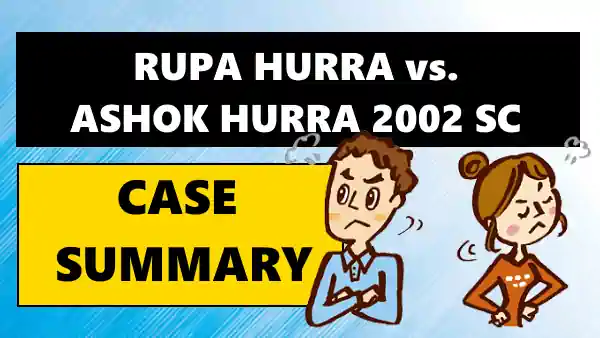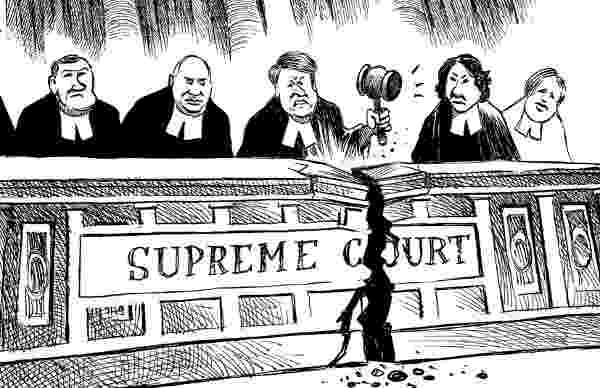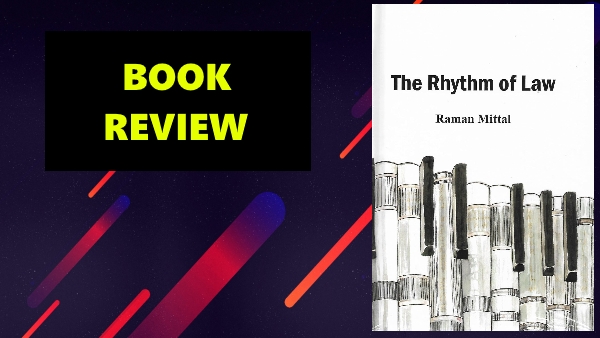Rupa Ashok Hurra vs. Ashok Hurra case apparently changed how our judicial framework functions and reaffirmed how the Indian judiciary can go to any degree to meet the finishes of justice.
FACTS OF RUPA HURRA vs. ASHOK HURRA CASE:
- Rupa Hurra vs. Ashok Hurra case is known for matrimonial dissension, however when the subject of the legitimacy of a pronouncement of divorce arrived at the Honourable Supreme Court of India and the lady pulled out her consent that she concurred while surrendering to divorce through mutual consent, significant inquiries of law emerged.
LEGAL ISSUES:
- Regardless of whether an aggrieved person is qualified for any alleviation against a last judgment or request of the Supreme Court, after excusal of Review Petition, either under Article 32 or otherwise?
RATIO & DECISION:
A Bench containing Chief Justice of India, Justice S.P. Bharucha, and his friend justices, Justice S.M. Qadri, Justice U.C. Banerjee, Justice S.N. Variava, and Justice S.V. Patil conveyed a landmark judgment that opened another aspect in the justice conveyance arrangement of this country.
- Article 32 conjures the writ jurisdiction in the idea of Habeas Corpus, Quo Warranto, Mandamus, Prohibition, and Certiorari. As to writ jurisdiction, it is set essentially similar to the High Courts in India situated as the court of Kings Bench in England. It is a very much settled rule that details related to the right of writs in English law play no part to play under our constitutional plan.
- It is, notwithstanding, essential to note that a writ of certiorari to call for records and look at something very similar for passing a proper request is given by a better court than a sub-par court which ensures the record for assessment.
- On cautiously inspecting the chronicled foundation and the idea of writ jurisdiction, which is of a better sort over sub-par courts and councils, the court believed that a writ of certiorari can’t be given to co-ordinate courts and even more so to predominant courts.
- However, the jurisdiction and orders of a High Court are at risk to be adjusted by the Supreme Court in its appellate jurisdiction under Articles 132[3], 133[4] and 134[5] just as under Article 136[6] of the Constitution, the High Courts are not established as substandard courts in our constitutional plan.
- Therefore, the apex court would not give a writ under Article 32 to a High Court. Further, neither a more modest Bench of the Supreme Court nor a bigger one can give a writ under Article 32 to some other Bench of the Supreme Court. We might additionally notice that the prevalent courts of justice don’t fall inside the ambit of “state” or “different specialists” under Article 12[7] of the Constitution.
CONCLUSION:
- Rupa Hurra vs. Ashok Hurra judgement is a seat mark in the field of judicial scrutiny. This case reaffirmed that the judiciary in this nation and uniquely the highest judicial body, the Honourable Supreme Court will investigate every possibility to grant justice to individuals.
- The court will go to any degree to fulfill the disputants that justice has been done regardless of whether it means to review its own decision a subsequent time.
Found Rupa Ashok Hurra vs. Ashok Hurra case summary useful? We have a bunch of useful topics from constitutional law that will help you in your preparation here >>> CONSTITUTIONAL LAW
Check out our YouTube Channel for free legal videos >>> LAW PLANET YT






